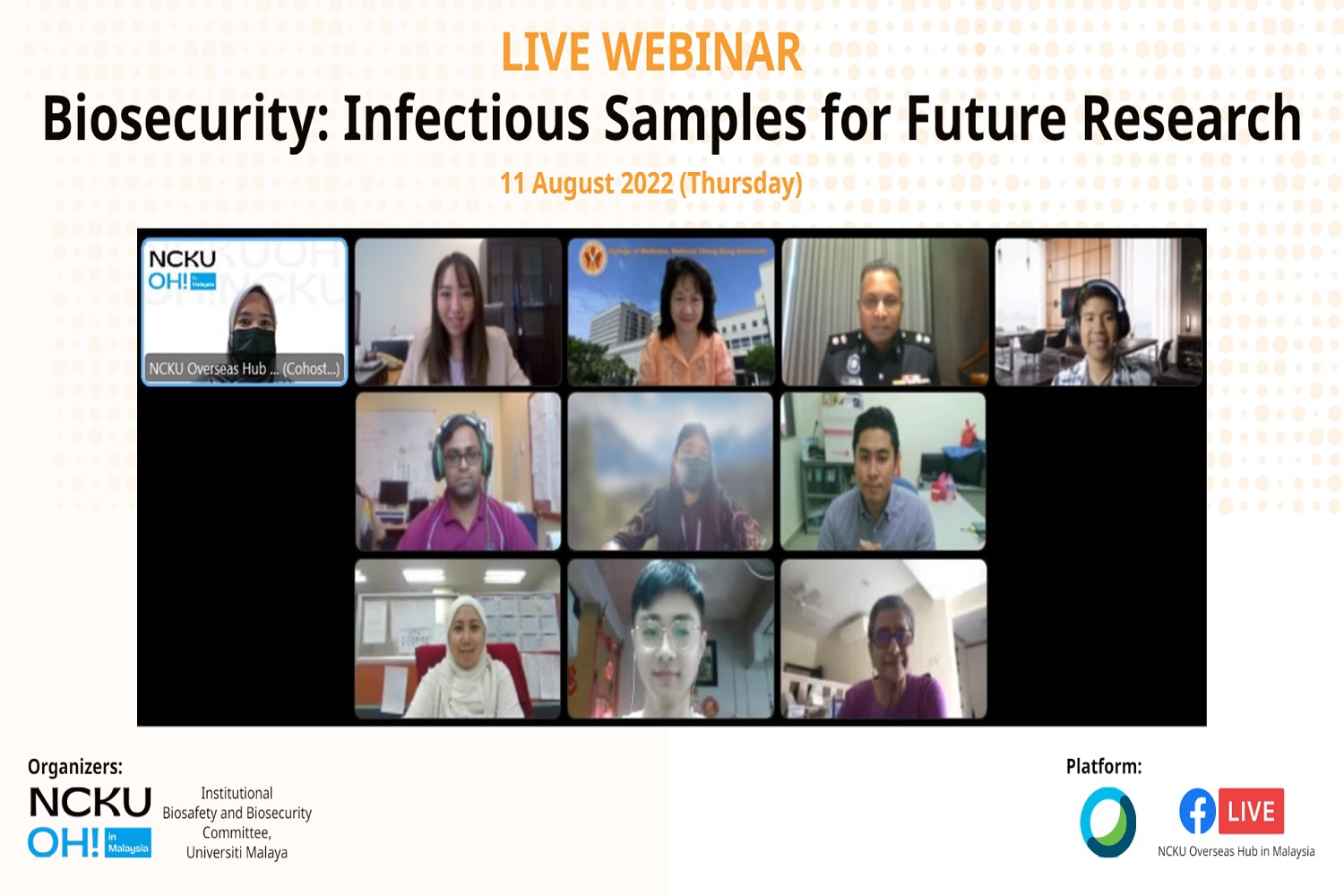Malaysia Business
[Webinar Series] Biosecurity: Infectious Samples for Future Research
2022-08-15

The NCKU Overseas Hub in Malaysia in collaboration with the Institutional Biosafety and Biosecurity Committee (IBBC), Universiti Malaya (UM) organized the “Biosecurity: Infectious Samples for Future Research” webinar on 11th August 2022 which was broadcasted on Cisco Webex and via NCKU Overseas Hub in Malaysia’s Facebook page. The session was recorded and available online at https://fb.watch/f81fCY0sLI/. The webinar was moderated by the Chairman of IBBC, Assoc. Prof. Dr. Lay Ching Chai, in the presence of three distinguished panelists: Prof. Dr. Jen-Ren Wang (Dept. of Medical Laboratory Science and Biotechnology, NCKU, Taiwan), Superintendent Saravanan Kanniappan (Assistant Director, National Central Bureau, INTERPOL, Malaysia) and Assoc. Prof. Dr. Viji Vijayan (Associate Dean, DUKE – NUS Medical School, Singapore).
Prof. Dr. Jen-Ren Wang presented a talk on “Biosecurity: A shared responsibility to protect public and scientific research”. She opened her talk by sharing on the 2001 Anthrax attack occurred in the United States which was spread intentionally by a top biodefense researcher. In one of her slides, she did explain on the aim of Biosecurity, which was to prevent unauthorized access, loss, theft, misuse, diversion or release. Prof. Wang shared on the components of laboratory biosecurity program management which includes facility security, material accountability, transportation security, information security and personal reliability. In addition, Prof. Wang shared a brief example on the workflow of NCKU laboratories which are working with pathogens and biotoxins.
The second panelist was Supt. Saravanan, who elaborated the topic from the perspectives from law and enforcement. Supt. Saravanan shared with the audience on what are the types of bio-agents and the types of bio-agent deliveries, how can the bio-agents be detected and what are the indicators. He mentioned that it is important to establish a communication mechanism within the different agencies incase of any biosecurity issues (E.g., missing vial of virus or bacteria). Supt. Saravanan also shared on the two penal codes in Malaysia which focuses on the negligent and malignant act in spreading infection of any disease dangerous to life. Before ending his presentation, he highlighted the importance for each entity (public health and law enforcement) to share the responsibility to secure the biosafety and biosecurity in the country.
Assoc. Prof. Dr. Viji presented on her slides entitled “Enhancement of Chemical, Biological, Radiological and Nuclear (CBRN) capabilities in Southeast Asia”. She explained on what is National Action Plan (NAP) and the status of each ASEAN countries. She shared some of her personal views and the collective views on the current gaps in the national laws/regulation varying stages in the ASEAN countries, and regions within countries. She mentioned that the biosafety awareness in ASEAN has increased; very large and active network has been formed with good open communication and sharing of knowledge. She highlighted that ultimately the CBRN must reach those on the ground which are the laboratory workers, and urged that good mentorship programs and implementation programs should be funded and developed.
The 90-minutes webinar has attracted participants not only from the academics/research field, but also from the government sectors. Among the participants were representatives from Universiti Malaya, Universiti Malaysia Sarawak, Sunway University, Science and Technology Research Institution for Defence and National Public Health Laboratory Malaysia. The next webinar jointly organized by the NCKU Overseas Hub in Malaysia and IBBC, UM will be on the “Countering Scientific Misinformation: What is the role of Scientific Community in this matter?”, scheduled on the 25th August 2022, 2.30pm (Malaysia and Taiwan).
Keyword: